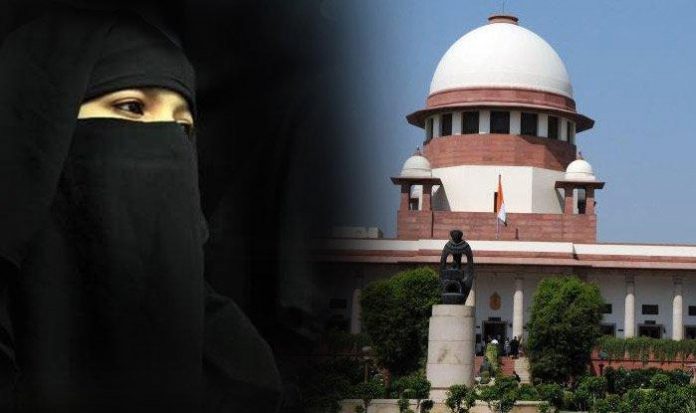By Raqib Hameed Naik, TwoCircles.net
New Delhi: A survey conducted by Centre for Research and Debates in Development Policy (CRDDP) has found that incidents of triple talaq among Muslims in India are rare and the government, selected political parties and media are sensationalising the matter in ways that looks as if the practice is widespread.
The CRDDP had launched its online survey between March and May 2017, in which a total of 20671 individuals (16,860 men and 3,811 women) took part. CRDDP found 331 reported talaqs from both women and men respondents, out of which only one case was that of oral instant triple talaq.
A quarter of the divorces occurred through the intervention of religious institutions such as the quazi and darul kaza; 16.9% cases occurred in presence of NGOs, or authorities from the Police Station and Panchayats; 36.2% occurred in the presence of elders and family when the man pronounced Talaq once a month over three months and 21.1% occurred through courts and notices.
The questionnaire was made available in English, Hindi, Urdu and roman Urdu language whose sets were organized based on gender and marital status. The respondents were asked to select the options from ‘multiple choice questions’ displayed. About 83% of the respondents took this survey in English followed by 12%t in Roman Urdu.
The study has found out that of 331 instances of divorce, the husband initiated talaq in 134 instances and woman herself has sought khula (divorce initiated by wife) in 126 instances. In 54 cases, other talaqs (divorce initiated by husband) the parents of the women initiated and accomplished woman’s khula or talaq. Out of 331 talaqs only one instance has been reported as a clear case of triple talaq reported by a female respondent.
The study further notes that the percentage of women staying in marriage is highest amongst Muslims (87.8%) compared to Hindus (86.2%), Christians (83.7%) and other religious minorities (85.8%).
“The percentage of widowed woman is least amongst Muslims (11.1%) compared to Hindus (12.9%), Christians (14.6%) and other religious Minorities (13.3%). It is likely that the culture of widow remarriages provides higher level family protection to Muslim women compared to women from other religious communities. The percentage of separated and abandoned women is also least amongst the Muslims (0.67%) compared to Hindus (0.69%), Christians (1.19%) and other religious Minorities (0.68%),” reads the report.
The researchers also consulted four Qazis from ‘Darul Quaza (family court)’ having expertise in Islamic jurisprudence and authorised to effect Khula or Talaq in the city of Hyderabad.
“While Nikah can be performed by many Qazis spread all over the city.Khula and Talaq can be settled only by these four Qazis. It is learned from a Qazi that during last seven years, he came across only two ‘triple talaqs’ cases. Another Qazi who has been practicing last 15 years has settled 160 divorce cases of which 130 are khula, 21 are regular talaq and only 9 were classified as ‘triple talaq’,” the study says.
The study has noted that the cases of triple talaq are rare and in cases where they have occurred, the community by and large has strongly stood by the side of the victim and tried to rehabilitate her.
It has also expressed concern over projecting miniscule victims of triple talaq as the major issue to be confronted to empower the Muslim community is questionable and have asked social policy strategist to be concerned about 43 million widowed women belonging to all part of the society; provide them incentives for remarriage and/or provide programmatic financial support for sustaining a living.
Reacting to the study, Navaid Hamid , President, All India Muslim Majlis-e-Mushawarat said that the study exposes the real agenda of people behind the triple talaq, “The issue of triple talaq is about cornering Muslim community on gender justice but the real motive is not the gender justice, but to humiliate Muslims and create an atmosphere of hate.
“It is aimed to create animosity against Muslims of India.The target isn’t the community only but their faith also and the study has factually come out with the data which clearly exposes widespread practice of triple talaq as claimed by BJP and its subsidiaries,” he told TwoCircles.net.
The Supreme Court has started discussions on triple talaq from Thursday, May 11.


